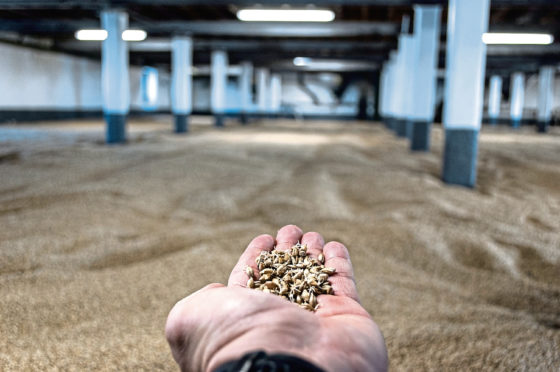Scottish growers have been told harvest may not be business as usual due to ongoing Covid restrictions.
One of the industry’s main customers – the whisky sector – is not yet fully up and running again since coronavirus-imposed shutdowns, and in many cases production has moved away from whisky to producing alcohol hand sanitiser for the NHS and other public services.
The Scotch Whisky Association (SWA) says both these factors are impacting demand for grain.
A spokeswoman for the association said: “Distilling is currently significantly scaled-back so that companies can ensure that social distancing can be fully observed by staff, whose health and wellbeing are our primary concern.
“We are in a regular dialogue with NFU Scotland (NFUS) and the Scottish Government about levels of distilling, not least since this is impacting on distillers’ demand for barley.”
She said the collapse of the global hospitality, tourism and travel retail sectors had resulted in a 17% drop in Scotch Whisky exports in the first quarter of 2020.
“Exports in the second quarter, which will take into account lockdown periods in Europe and North America, are also likely to show a significant fall,” added the spokeswoman.
Scotgrain Agriculture’s commercial director, Keith Headridge, said the Covid-19 crisis should have limited impact on demand for malting barley at harvest.
He said Scotgrain – the procurement arm of Bairds Malt which sources grain from farmers on the east coast from Inverness in the north to East Lothian in the south – had taken steps to ensure it could operate successfully in accordance with social distancing rules.
Mr Headridge added: “In our business we will be very close to where we normally are (at harvest).
“We have taken steps to ensure the stores are empty and the sites are ready to take grain. We are trying to ensure harvest runs as near normal as possible.”
Meanwhile, NFUS combinable crops chairman, Willie Thomson, says Covid-19 rules may cause delays in hauliers getting grain off farms at harvest.
Mr Thomson has advised growers to “prepare for the worst, and hope for the best”.
He said: “Everyone has to be aware that it probably won’t be business as usual and there could be hold-ups, even with the sampling of grain.”
